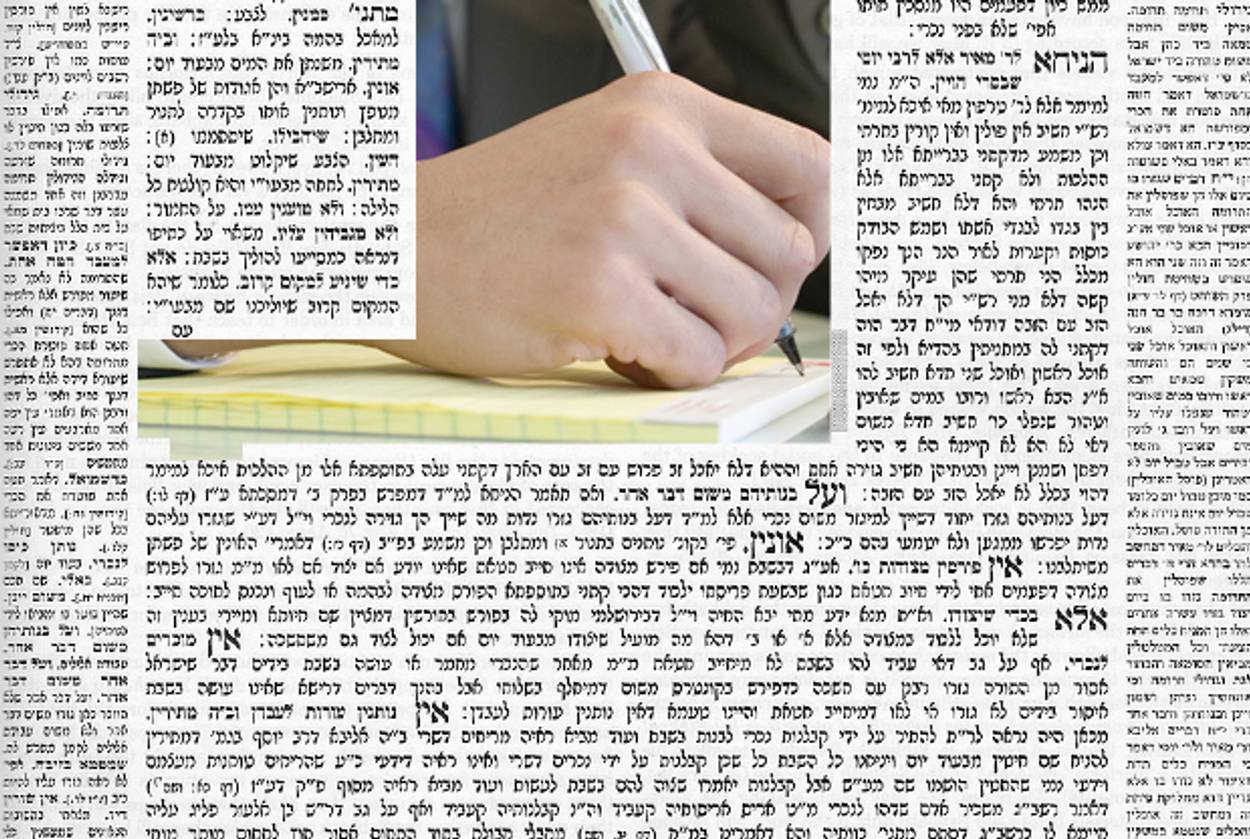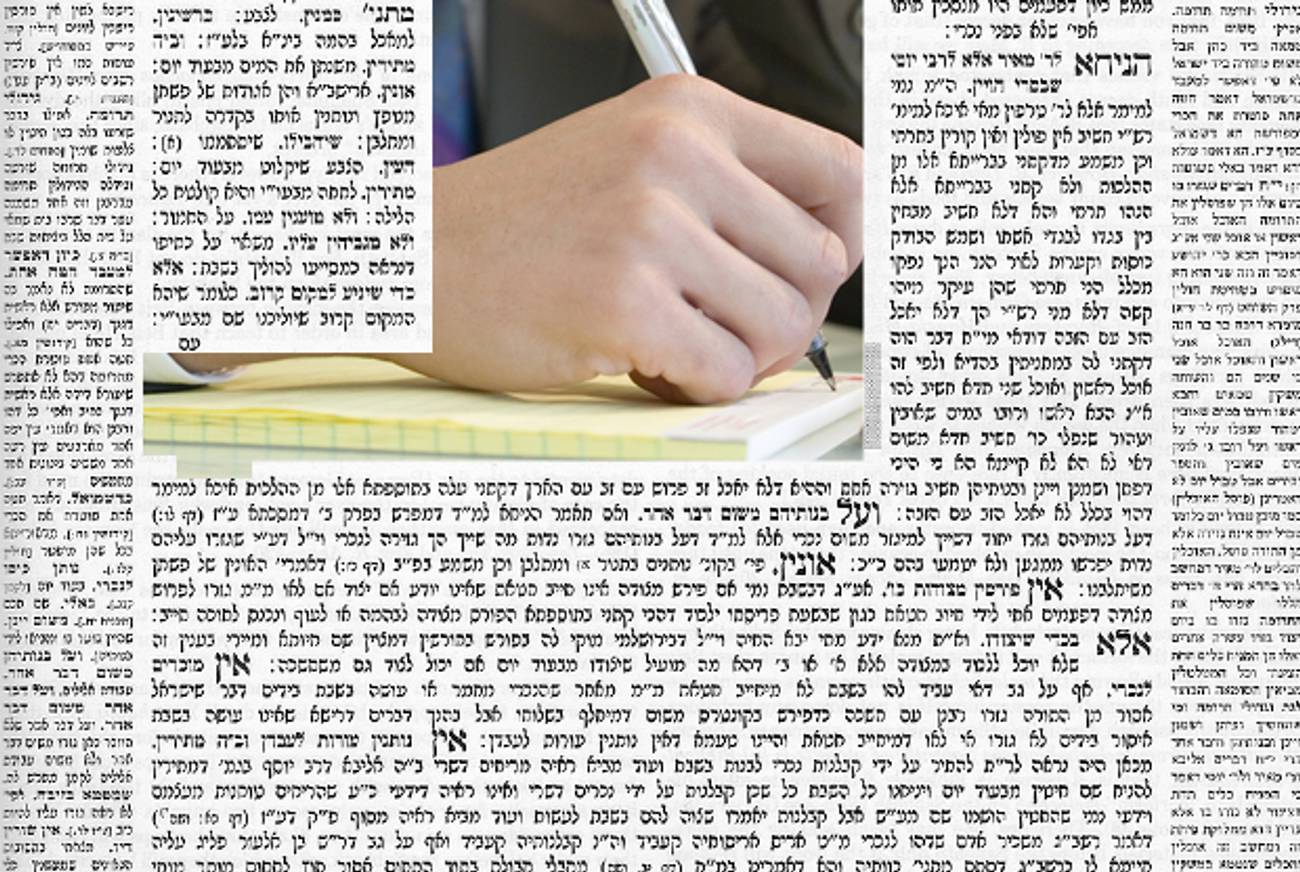The Irrelevance of Pleasure
As the rabbis remind us again this week, the law is the law—whether it pleases you or not




Literary critic Adam Kirsch is reading a page of Talmud a day, along with Jews around the world.
Last week, I discussed the Talmud’s declaration that “the world is a wedding,” a brief celebration that should be enjoyed to the full while it lasts. But what kind of enjoyment are the rabbis talking about? The passage in question mentions food and drink; but as we learned in this week’s Daf Yomi reading, the supreme earthly pleasure for the rabbis is always Torah study. This becomes clear in Eruvin 65a, when we hear about the study habits of Rav Chisda, whose daughter once asked him: “Does the master not need to doze a little?” Chisda replied with the Talmudic equivalent of “I’ll sleep when I’m dead”: “Soon [that is, in the grave], there will come days that are long [for the purpose of sleeping] and short [for the purpose of Torah study], and we will sleep very much.”
This is a kind of carpe diem, but utterly without the erotic hedonism usually associated with that phrase. Chisda’s sentence reminded me of the famous lines of the Latin poet Catullus, who pleaded with his lover: “For us, once our brief sun sets,/We must sleep an eternal night./Therefore give me a thousand kisses, then a hundred,/Then another thousand, then another hundred.” For the Roman, death was a reminder to make hay while the sun shines; for the Jew, it is a reminder to study Torah while the sun shines. Or, indeed, while the moon shines, for in the opinion of Shimon ben Lakish, “The moon was created specifically for Torah study.”
The proper discipline of the Talmud scholar was a major theme of the first part of Chapter 6 of Tractate Eruvin, which we began to read this week. Ostensibly, the subject of the chapter is a further refinement of the law of courtyard eruvs, which were discussed at the beginning of the tractate. When houses share a courtyard, or chatzeir, the owners are permitted to legally merge their residences for the purpose of Shabbat. This allows them to treat the whole courtyard as a private domain, in which carrying is permitted.
As long as all the residents of a courtyard are Jews, this doesn’t present a problem. But what happens, the Mishnah asks, if one of the residents is a non-Jew, an “idolater”? (The Hebrew term for idolater is rather poetic: oved kochavim, a servant of the stars.) The Tannaim rule that it is impossible for a Jew to establish an eruv with a non-Jew—or, for that matter, with a Jew who rejects the authority of the Oral Law (like the Second Temple-era Sadducees), and so believes eruvs to be illegitimate.
The Gemara goes on to explain that the residence of an idolater has no legal status in Jewish law—it is considered ownerless, “similar to an animal stable.” Because a non-Jew can’t join in an eruv, the Jews in the courtyard must rent the premises of the non-Jew for the duration of Shabbat, using either a formal lease or what the rabbis call a “token lease,” one that requires only a nominal exchange of money.
This requirement was instituted, the Gemara candidly explains, specifically in order to make it difficult for a Jew to live alongside a non-Jew. In Talmudic times, the text makes clear, Jews and non-Jews were expected to regard each other with grave suspicion. To a Jew, “an idolater is suspected of having murderous intentions,” and conversely, “the idolater will be suspicious that the Jew is engaged in acts of sorcery.” For these reasons, the Talmud says, it is virtually unheard of for a Jew to live alone in a non-Jewish courtyard. By increasing the legal burden on a Jew cohabiting with non-Jews, the rabbis hoped to discourage such mingling even further. Clearly, multiculturalism is not a Talmudic value.
After this discussion, the Gemara makes a characteristically lateral move to a new subject. In the course of the argument, the rabbis declare that the halakhah on a certain point follows Rabbi Eliezer ben Yaakov, whose mishnaic rulings are said to be “limited and pure”: that is, while he has few legal opinions to his name, the ones he did issue are always authoritative.
This leads Abaye to raise an unexpected question. Ordinarily, it is forbidden for a Torah sage, no matter how eminent, to issue a legal ruling “in the vicinity of his teacher.” A student must always defer to his teacher’s authority, even after he has become a master himself. But if it is a rule of thumb that Eliezer ben Yaakov’s view is always right, can a disciple issue a decision following Eliezer in the presence of his teacher? In other words, does the law of precedence apply even in routine cases, where there can be no doubt of the right answer to a question?
The answer, we quickly learn, is yes. Even when the student knows for sure what his teacher would say in response to a certain problem, he is forbidden to anticipate his teacher’s ruling. This is a clear demonstration of the patriarchal nature of rabbinic authority: A teacher is like a father, a student like a son, and the son must always humble himself before the father. The Gemara goes on to explain that this applies only to a student’s primary teacher; if a student has learned a small amount of Torah from another elder, he does not need to defer to him once he has become the elder’s talmid chaver, or peer in learning.
To make things crystal clear, we learn on Eruvin 63a that a disciple who renders legal decisions in the presence of his teacher “is liable to death.” That is how the Gemara interprets the enigmatic episode in Leviticus where Aaron’s two sons, Nadab and Abihu, offer “strange fire” on the Lord’s altar and are punished by being burned up by a flame from Heaven. On its face, the crime of Nadab and Abihu seems to be a cultic or ritual violation: They contaminated the tabernacle with unclean incense. To the rabbis, however, their crime appears different and more substantive. By deciding for themselves when to make a sacrifice, they effectively “rendered a legal decision in the presence of Moses, their teacher,” and it was for this arrogance that they were punished.
Later, on Eruvin 64a, we learn another point of rabbinic protocol. On one occasion, Rav Nachman heard Rav Yehudah state a certain point of law and pronounced the ruling “excellent.” Then Rav Yehudah ruled that a rabbi who has drunk wine cannot make legal decisions, since he is not in full possession of his judgment. But this time Nachman did not agree, and he said: “This statement is not excellent; for until I drink wine my mind is not clear.” This demurral got Nachman into double trouble. First, he was wrong on the merits: The Gemara goes on to discuss at length how drinking wine renders a Jew unfit for prayer, much less for rendering a complex legal judgment.
Second, Nachman erred by expressing his personal opinion about another sage’s Torah rulings. “Anyone who comments ‘this statement is beautiful’ and ‘this is not beautiful,’ ” said Acha bar Chanina, “diminishes the honor of the Torah.” The law is so sacred that it is forbidden to prefer one part of it to another. Whether the rabbis always held themselves to such a strict standard is open to doubt. Certainly, I have already come across several occasions where a particular sage’s ruling is singled out for praise. But the stern Talmudic principle is clear: The law is the law, whether it pleases you or not.
***
Like this article? Sign up for our Daily Digest to get Tablet Magazine’s new content in your inbox each morning.
Adam Kirsch is a poet and literary critic, whose books include The People and the Books: 18 Classics of Jewish Literature.
Adam Kirsch is a poet and literary critic, whose books include The People and the Books: 18 Classics of Jewish Literature.